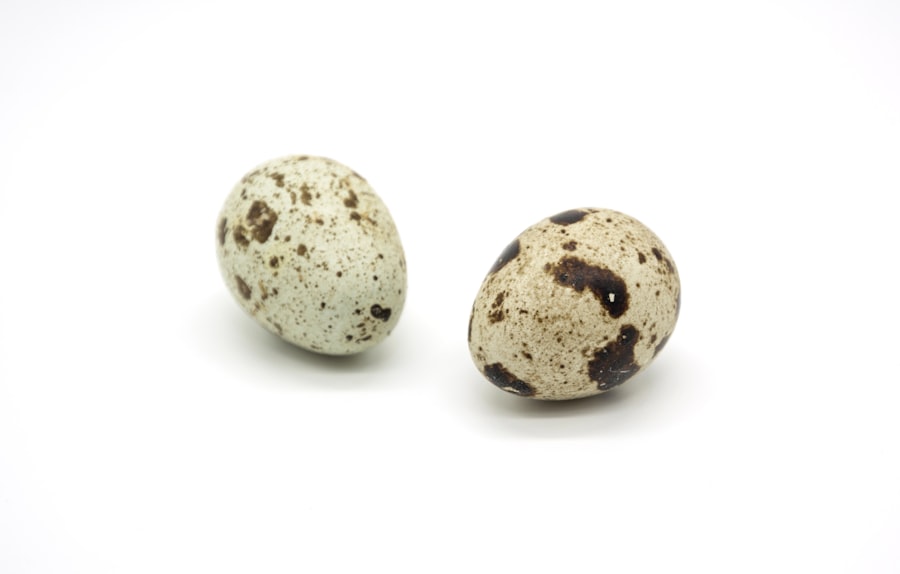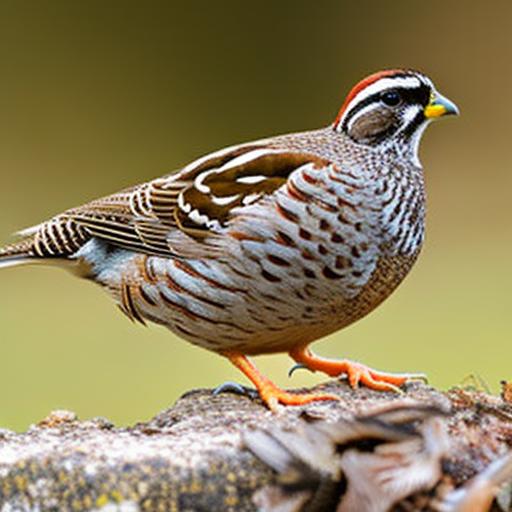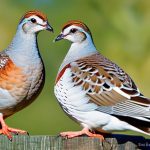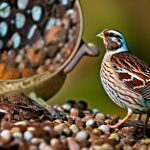Quails are small, ground-dwelling birds that are known for their social behavior and strong flocking instincts. They are highly active during the day, foraging for food and engaging in social interactions with other members of their flock. Quails are also known for their ability to fly short distances, especially when startled or threatened. Understanding quail behavior is essential for providing them with a suitable environment and ensuring their overall well-being.
Quails are social birds that thrive in the company of their own kind. They are known to form strong bonds within their flock and rely on each other for protection and social interaction. It is important to provide quails with enough space to move around and engage in natural behaviors such as dust bathing, foraging, and socializing. Additionally, quails are known to be easily stressed by sudden changes in their environment or routine, so it is important to handle them gently and minimize disturbances in their living space.
Key Takeaways
- Quail are social birds and should be kept in groups to prevent stress and aggression.
- Provide a suitable environment with enough space, hiding spots, and proper lighting for quail to thrive.
- Quail require a balanced diet of commercial feed, fresh water, and occasional treats like fruits and vegetables.
- Manage stress by minimizing disturbances, providing a quiet environment, and handling quail gently.
- Monitor egg production to ensure the health and productivity of your quail flock.
- Maintain cleanliness by regularly cleaning the coop, providing fresh bedding, and keeping feed and water containers clean.
- Seek veterinary care if you notice any signs of illness or abnormal behavior in your quail.
Providing a Suitable Environment
Creating a suitable environment for quails is essential for their health and well-being. Quails require a spacious and secure enclosure that provides them with enough room to move around, forage for food, and engage in natural behaviors. The enclosure should also be equipped with suitable bedding material, such as straw or wood shavings, to provide a comfortable and clean living space for the quails. Additionally, the enclosure should be predator-proof to protect the quails from potential threats.
In addition to a secure enclosure, quails also require access to outdoor space where they can forage for insects, seeds, and other natural food sources. Providing them with access to a safe outdoor area not only allows them to engage in natural behaviors but also helps to supplement their diet with essential nutrients. It is important to ensure that the outdoor area is fenced off and protected from predators to prevent any harm to the quails.
Proper Nutrition
Proper nutrition is essential for the health and well-being of quails. A well-balanced diet is crucial for ensuring that quails receive all the essential nutrients they need to thrive. Quails are omnivorous birds that require a diet rich in protein, vitamins, and minerals. A commercial quail feed that is specifically formulated for their nutritional needs can serve as the foundation of their diet. Additionally, quails can also be supplemented with fresh fruits and vegetables, as well as sources of animal protein such as mealworms or small insects.
It is important to provide quails with access to clean and fresh water at all times. Water is essential for maintaining their overall health and plays a crucial role in their digestion and metabolism. Additionally, providing quails with access to grit or small stones is important for aiding in their digestion, as it helps them grind down their food in their gizzards.
Managing Stress
Managing stress is crucial for the overall health and well-being of quails. Quails are sensitive birds that can easily become stressed by sudden changes in their environment, loud noises, or disturbances in their living space. It is important to handle quails gently and minimize any potential sources of stress in their environment. Providing them with a secure and comfortable living space, as well as opportunities for natural behaviors such as dust bathing and foraging, can help reduce stress levels.
Additionally, it is important to introduce new birds to an existing flock gradually to prevent any potential conflicts or stress among the quails. Monitoring the behavior of the quails on a regular basis can help identify any signs of stress or aggression, allowing for prompt intervention to address any potential issues.
Monitoring Egg Production
Monitoring egg production is an important aspect of quail husbandry, especially for those who are raising quails for their eggs. Keeping track of egg production can provide valuable insights into the overall health and well-being of the quails, as well as help identify any potential issues that may arise. It is important to keep a record of the number of eggs laid by each quail on a daily basis, as well as monitor the quality and size of the eggs.
Additionally, monitoring egg production can help identify any potential health issues or nutritional deficiencies that may be affecting the quails. A sudden decrease in egg production or changes in the quality of the eggs may indicate underlying health issues that need to be addressed promptly. Regular monitoring of egg production can help ensure that the quails are receiving proper nutrition and care, ultimately leading to healthy and productive birds.
Maintaining Cleanliness

Maintaining cleanliness is essential for ensuring the health and well-being of quails. A clean living environment helps prevent the spread of diseases and parasites, as well as provides a comfortable and hygienic space for the quails to thrive. Regularly cleaning and disinfecting the enclosure, as well as removing soiled bedding material, can help prevent the buildup of harmful bacteria and pathogens.
In addition to cleaning the enclosure, it is important to regularly clean and sanitize feeders and waterers to prevent contamination and ensure that the quails have access to clean and fresh food and water at all times. Providing clean nesting boxes for laying hens is also essential for maintaining egg quality and preventing the spread of diseases.
Seeking Veterinary Care
Seeking veterinary care is crucial for maintaining the health and well-being of quails. Regular check-ups with a qualified avian veterinarian can help ensure that the quails are in good health and receive prompt treatment for any potential health issues that may arise. Additionally, a veterinarian can provide valuable guidance on proper nutrition, disease prevention, and overall husbandry practices to ensure the best possible care for the quails.
It is important to seek veterinary care at the first sign of any health issues or abnormalities in the behavior or appearance of the quails. Prompt intervention can help prevent the spread of diseases and ensure that any potential health issues are addressed before they escalate. Additionally, a veterinarian can provide valuable insights into preventative care measures that can help maintain the overall health and well-being of the quails.
If you’re looking for tips on how to keep your quail laying consistently, you’ll want to check out the article “What Kind of Coop is Best for Chickens” on PoultryWizard.com. This informative piece provides valuable insights into creating the ideal environment for poultry to thrive and lay eggs regularly. With practical advice and expert recommendations, it’s a must-read for anyone seeking to optimize their quail’s laying productivity. Learn more here.
FAQs
What are some factors that can affect quail laying?
Some factors that can affect quail laying include diet, lighting, temperature, stress, and the age of the quail.
What should be included in a quail’s diet to promote laying?
A quail’s diet should include a high-quality commercial feed that is specifically formulated for laying quail. Additionally, providing access to calcium supplements, such as crushed oyster shells, can help support egg production.
How can lighting affect quail laying?
Lighting plays a crucial role in quail laying. Quail require a minimum of 14-16 hours of light per day to stimulate egg production. Using artificial lighting in the quail housing can help ensure they receive the necessary amount of light.
What temperature range is ideal for quail laying?
Quail thrive in temperatures ranging from 60-75 degrees Fahrenheit. Extreme temperatures, either too hot or too cold, can negatively impact quail laying.
How does stress impact quail laying?
Stress can significantly reduce quail laying. It is important to minimize stressors in the quail’s environment, such as overcrowding, loud noises, or sudden changes.
At what age do quail start laying eggs?
Quail typically start laying eggs around 6-8 weeks of age, depending on the breed.
Meet Walter, the feathered-friend fanatic of Florida! Nestled in the sunshine state, Walter struts through life with his feathered companions, clucking his way to happiness. With a coop that’s fancier than a five-star hotel, he’s the Don Juan of the chicken world. When he’s not teaching his hens to do the cha-cha, you’ll find him in a heated debate with his prized rooster, Sir Clucks-a-Lot. Walter’s poultry passion is no yolk; he’s the sunny-side-up guy you never knew you needed in your flock of friends!







